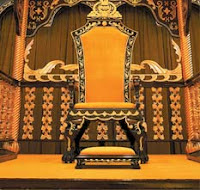Nurul Iman Palace
The early history of the nation’s unique monarchy can be pieced together from accounts taken from Chinese, Javanese and local Bruneian records. The first ruler, Sultan Muhammad Shah, known as Awang Alak Betatar, is said to be responsible for introducing Islam to Brunei, forever altering the course of the nation’s history and cultural landscape.
brunei Palace
The second ruler was Sultan Ahmad, followed by a third Arab Sultan, Sharif Ali,
considered to be a descendant of the Prophet Mohammad. Also known as Sultan
Berkat, he married the daughter of Sultan Ahmad and consolidated the monarchy with
the Islamic faith. Following him was Sultan Sulaiman, who was succeeded by the
most renowned ruler in Brunei's early history, Sultan Bolkiah. Under the rule
of Sultan Bolkiah, Brunei began to expand into an empire, with territorial
holdings that would eventually encompass the island of Borneo and parts of the
Philippines.In 1888, Brunei became a British protectorate and in 1906, the British Residential System was introduced. Brunei was eventually granted internal self-government, and Sultan Omar Ali Saifuddien promulgated the nation’s new Constitution on 29 September 1959.
In 1967, the current Sultan, His Majesty Sultan Haji Hassanal Bolkiah Mu'izzaddin Waddaulah was made the 29th ruler of Brunei Darussalam, leading the nation achieving its independence in 1984. The Sultan declared Negara Brunei Darussalam ("Brunei, The Abode of Peace") as a sovereign, democratic and independent Malay Muslim Monarchy (Melayu Islam Beraja) which would be administered according to the teachings of Islam.
Source :
http://www.bruneitourism.com/








Brunei Monarchy
ReplyDelete